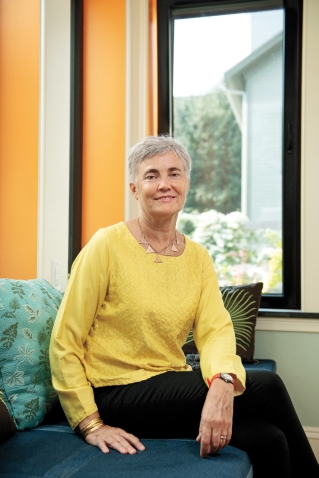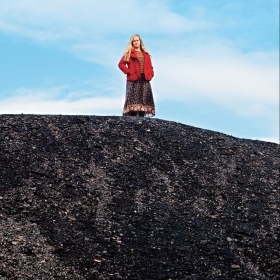Webb Chappell
When Robin Chase ’80 goes to her local Cambridge, Mass., grocery store or heads to Upper Mystic Lake for a swim, she gets there on her electric bike.
That’s her preferred mode of transportation these days and a fitting vehicle for the longtime transportation entrepreneur, who is still laser-focused on reimagining global transportation to curb climate change and make mobility more equitable.
Chase is best known for unlocking the potential of the collaborative economy by co-founding Zipcar, the world-famous car sharing network. Through the company, Chase solved a problem she herself had at the time: She was a mother of three who often needed the family car while her husband was at work, but she didn’t want to buy a second vehicle.
She started Zipcar in Cambridge as an alternative to the expense and hassle of owning a car in a city. Her goal was to make access to cars as simple as getting cash from an ATM. Since then, Zipcar has expanded to more than 500 cities and towns across the globe serving more than 1 million members. Each Zipcar takes about 13 personally owned cars off the road, greatly helping reduce CO2 emissions.
Zipcar also paved the way for the creation of many other companies around the world that utilize excess capacity to make life easier, less expensive, or friendlier for the environment, like Airbnb and Stashbee, the “Airbnb of storage.”
After leaving Zipcar in 2003, Chase founded several transportation and mobility-related companies and nonprofits, including Veniam, a network company that moves terabytes of data every month between vehicles and the cloud, and her most recent venture, NUMO, a global alliance focused on creating transformational, on-the-ground changes to urban mobility.
She advises governments around the world on transportation and climate initiatives, has served on multiple boards, and has been recognized as one of the Fast Company Fast 50 innovators and one of Time magazine’s 100 most influential people.
In all of her work, Chase has shown a steadfast commitment to reducing CO2 emissions and making the world a better place for future generations, including her children and grandchildren.
“Transportation is the invisible glue for every single other thing that’s good in your life,” Chase says. “So, education, health, jobs, friends, recreation—they’re all made possible by transportation. It’s also the single largest contributor to CO2 emissions. It’s become my life’s passion.”
Chase caught the entrepreneurial bug growing up in the Middle East. She was born in Holland, but moved with her family to Lebanon and Morocco, among other Middle Eastern countries, because her father was a career diplomat.
From a young age, Chase has felt grateful. “I’ve always really reflected on and understood the luck of my circumstance,” she says. “Of how lucky and privileged I was to have been born American, to have been born to a family with two parents, to have been born to parents that cared about education.”
When it came time for college, Chase studied at the American College in Paris for a year and a half before applying to Wellesley, where she triple-majored in English, French, and philosophy.
“When I got to the U.S. as a young adult, I was filled with stereotypes of what Americans were like,” Chase says, even though she had spent several years living in the U.S. in between stints abroad. In the U.S., “it was culture shock.”
Wellesley was her introduction to American culture. During her first, eye-opening year, she learned from women from across ethnicities, social classes, and sexual orientations. “Wellesley’s diversity was very important to me,” Chase says. “By the end of my time at Wellesley, I could begin to parse American cultural groups. It was this amazing oasis in which I could grapple with the social, personal, and academic all at once.”
After Wellesley, Chase took a job at JSI, a firm in Boston working on public health USAID contracts. Then she earned an M.B.A. from MIT Sloan. Soon after, when a fellow neighborhood mom wanted to start a technology-driven car sharing company similar to what she’d seen in Europe, Chase quickly got on board. Sharing a car made sense to her when most Americans drive their car 5% of the time and park it the other 95%. “I was the right person at the right time for the idea,” says Chase, who became Zipcar’s CEO.
She was an outsider at the time in the car industry, and she believes that fact, combined with her tenacity and a willingness to learn quickly, was what made Zipcar succeed. The company put its first vehicle, a lime green Volkswagen named Betsy Beetle, on the road in 2000.
“Robin has audacity,” says Harriet Tregoning, a colleague of Chase’s and director of NUMO. “She’s been one of those consistent voices saying we could approach transportation in a different way that’s better for the environment, for people’s pocketbooks, and more equitable than the path that we’ve been on. She’s collaborative, she’s creative, and she’s also a very thoughtful person. She’s the mother of the sharing economy.”
After Chase left Zipcar, she completed a Loeb Fellowship at Harvard Graduate School of Design before starting several more companies and nonprofits. In 2015, she published her book, Peers Inc. It looks at what the future will be like in a world in which people and companies collaborate using digital infrastructure to deliver smarter products and services while addressing climate change. “The best way to collaborate is to share your excess capacity,” Chase says.
Now, Chase is focused on issues like data privacy as transportation becomes more digitized. “We need to have better rules, standards, and regulations,” she says. She’s also active in her local Boston community, having been a prominent voice in the debate around how to rebuild parts of the Massachusetts Turnpike.
In 2020, she co-wrote an op-ed in the Boston Globe with her friend Doug Foy, former president of the Conservation Law Foundation who also previously served as Massachusetts’ first secretary of commonwealth development. The two encouraged city planners to see the project to rebuild the Mass Pike’s Allston interchange as a “city-building opportunity that can improve livability, expand sustainable choices, and increase equity.”
“Robin is certainly one of the most dedicated and effective voices in the whole arena of transportation strategy,” Foy says. “She sees better than most anyone ways in which to make transportation more sustainable, more benign, more community friendly, and more climate friendly, all of which are critically important.”
Transportation is now the largest source of greenhouse gas emissions in the United States. “If we don’t get our arms around it and fix it, we’re not going to solve climate change,” adds Foy. “Robin has seen that for decades. She has a very clear vision of what needs to change, and she’s unstoppable in pushing those issues forward.”
These days Chase is also enamored with the rise of electric micro mobility, or the heightened interest in vehicles like electric bikes and scooters.
“These are game-changing,” she says, because they hold the potential to give mobility to the some 50% of people worldwide who don’t have easy access to a car. Safe and secure infrastructure is key.
Chase’s husband, Roy, also has an electric bike, and so does the couple’s Brooklyn-based daughter, Cameron. Chase even recently got Sen. Bernie Sanders of Vermont to test drive an electric bike.
“I’m creating the world that I want to live in … . The world I want to live in has local, walkable, communities. I have local relationships, and there’s a local economy. Storytelling really matters. I think it’s on us to tell the story that we want the future to be,” Chase says.








We ask that those who engage in Wellesley magazine's online community act with honesty, integrity, and respect. (Remember the honor code, alums?) We reserve the right to remove comments by impersonators or comments that are not civil and relevant to the subject at hand. By posting here, you are permitting Wellesley magazine to edit and republish your comment in all media. Please remember that all posts are public.